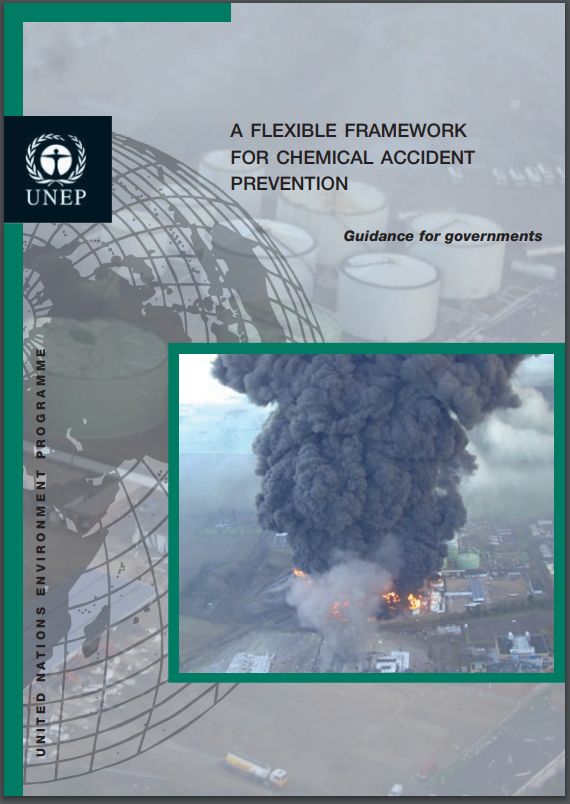These documents  from the United Nations Environmental Programme (UNEP) provides guidance for governments wanting to develop, review or strengthen their national chemical accidents prevention and preparedness programme.
from the United Nations Environmental Programme (UNEP) provides guidance for governments wanting to develop, review or strengthen their national chemical accidents prevention and preparedness programme.
UNEP is leading an international initiative to promote chemical accident prevention and preparedness. The initiative focuses on the development and implementation of a Flexible Framework for Chemical Accident Prevention and a Flexible Framework for Addressing Chemical Accident Prevention and Preparedness. Both offering guidance for governments wanting to develop, review or strengthen their national chemical accidents prevention and preparedness programme.
Almost every country experiences chemical accidents each year. These occur at small facilities such as pesticide warehouses and large installations such as refineries, at public facilities (including water treatment plants using chlorine or private manufacturing facilities for the chemical, pharmaceutical, and consumer products industries), in urban settings and industrial parks or in rural areas where there might be mining operations or refrigeration facilities. The purpose of the guidance and the brochure are to support countries and their governments that want to develop, improve, or review their programme for chemical accident prevention and preparedness related to hazardous installations. The focus of the guidance document is prevention and preparedness at fixed installations, designed to help countries establish a programme that is appropriate for their particular circumstances, including the level and nature of risks, the available resources, and the legal and cultural context. Naming the guidance “Flexible Framework” aims to reflect the fact that it is meant to be used by any country, irrespective of location, size, or level of industrialisation, with the expectation that each country would design its own programme.
The primary aim of the brochure document, Flexible Framework for Addressing Chemical Accident Prevention and Preparedness, is to assist countries with reviewing their chemical accidents programme to identify opportunities to prevent and/or reduce the likelihood of chemical accidents and to improve preparedness so as to minimise any impacts on people, communities, the environment, and property should an accident occur. This includes large and small countries, whether they have significant risks of chemical accidents (e.g., a country with large chemical facilities) or have more limited risks (e.g., a country with no chemical manufacturing or processing industry but which has several warehouses of pesticides, water treatment facilities using chlorine, and/or a port that receives bulk chemicals in transit to other countries).
In order to help individual countries to build institutional capacity and to revise and/or develop transparent, efficient and effective systems aimed at chemical accident prevention and preparedness, UNEP drafted an additional document containing case studies from countries where the application of the “Flexible Framework” has proven to be successful.
Consult the brochure here the guidance here and the case studies for implementation here.